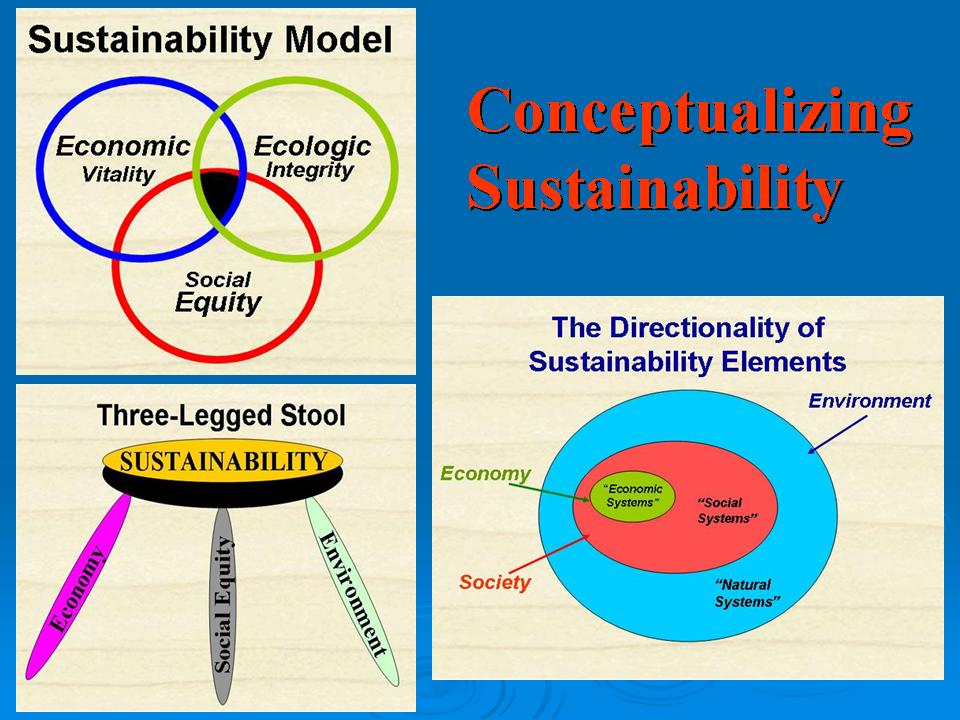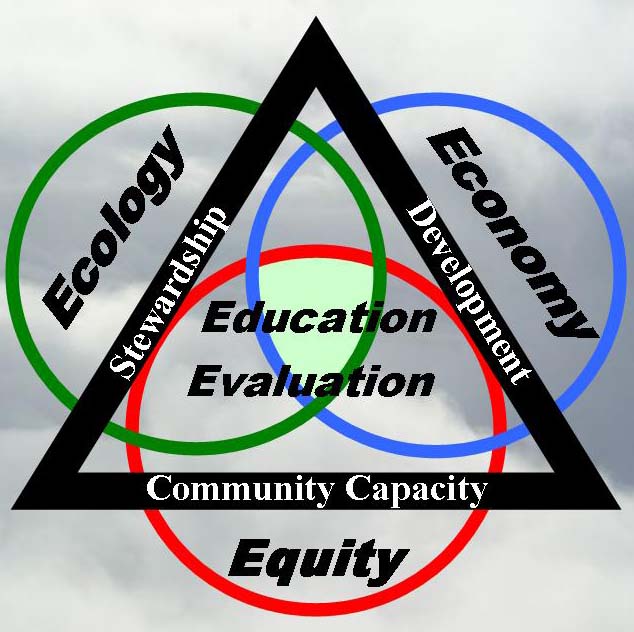
The
difficulty that arises from the complex issue of
sustainable development becomes more clear when one
considers the following: we may have equal or
better economic
opportunities
than
our ancestors, but do we have more social and environmental
benefits or opportunities? Sustainable development involves
the carrying out of activities that offer economic benefits
in the present without negatively affecting social and
environmental choices that are available to people in
the future, or in other places.
Most
discussions about the meaning of sustainable development
are
usually reduced to the
Brundtland Commission statement
that we should be concerned about the "needs of
the future" in our thinking about sustainability.
Sustainable futures, however, are not clear in advance.
Instead of attempting to understand the potential needs
of the future, which is really impossible to do, present
societal members, through a program of participatory
social experimentation and learning, should instead be
concerned about making sure that the opportunities they
have to achieve their own values, the things important
to them, are not in any way constrained for other places
or the future by actions they might take. And this process
must encourage the connection of scientific information
with cherished human values.
To
hold open options requires the complicated and difficult
process
of a community attempting
to conscientiously
specify what obligations toward people in other places
and the future it accepts, which require protection of
the stuff so designated as long as present society’s
costs are bearable, and to compare those ideals its members
would like to project into the future with the very real
and present needs of people in the present generation
(Norton,
2005). If individuals fulfill their needs in
such a way as to destroy important options, for example
individuals in earlier generations over-consume and do
not create new opportunities, changing the environment
that subsequent generations encounter, than this leaves
more constraints and reduces opportunities, making survival
more difficult.
In
other words, people should be concerned about making
sure
the opportunities they
have to achieve their own
core values, the things important to them (range of environmental,
social, and economic opportunities), are not in any way
constrained for other places or people in the future
by actions taken today. When we state a set of ideals
(values) for what we want our community to be like, we
identify those options and opportunities that give meaning
to life in a place (Norton,
2005) for the present and
for as much as we know about the future. “Important
options” represent a variable to be specified as
particular communities articulate their values and decide
what is important to save for posterity. “An action
or a policy is not sustainable if it will reduce the
ratio of opportunities to constraints on people in the
future” (Norton,
2005).
All
people today should have sufficient resources (human,
financial,
environmental) to meet
their needs, provided
in a way that does not interfere with the ecological
integrity of natural systems (options always depend upon
having healthy environments and productive natural resources),
so that similar options will be open to future generations.
Our task ahead is to shape a sustainable future, using
resources less intensively, where “resources” includes
those things that support our economic and social productivity
while also absorbing our waste products, by combining
social, economic and environmental strategies that produce
opportunities and minimize constraints for future generations
(Norton,
2005) and people in other places through the
practice of sustainable development.
The
bottom line: communities themselves are responsible
for
choosing what is important to monitor
and what is
important to protect, not inhibited by some kind of sustainability
definition established somewhere else. Acting sustainably,
assuring sufficiency and opportunity, guarantees a resource
will not fall below a threshold required to perpetuate
it through time as a foundation to insure all people
have sufficient resources to achieve a decent life and
that everyone has opportunities to seek improvements
in ways that do not compromise future generations (Gibson,
2006 - JEAPM, Vol 8 No. 3). In many instances it
comes down to differentiating “needs” from “wants.” Decision-making
should encourage equitable distribution of resources
to create a sense of fairness, identifying and satisfying
real needs before wants and leaving options open for
future generations. Living sustainably is maintaining
the important mix of options and opportunities while
creating no new and burdensome constraints; living unsustainably
is losing them, narrowing the range of options that people
in other places or subsequent generations can choose
among in their attempt to adapt, survive, and prosper
(Flint,
2006). Sustainability is most fundamentally equality
over time and place, making sure we consume less than
Earth’s natural resources can provide. Economic
development that is sustainable must be both environmentally
sound and shared fairly among all societal members. Not
to meet this objective is to open the doors of conflict.

